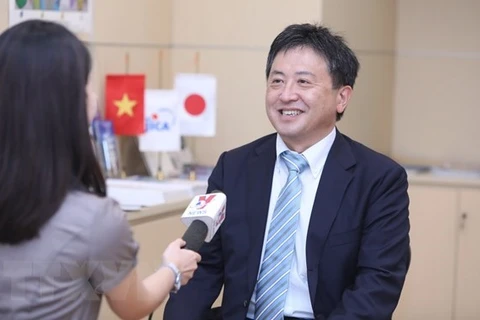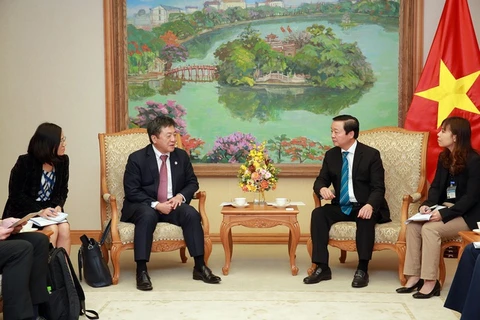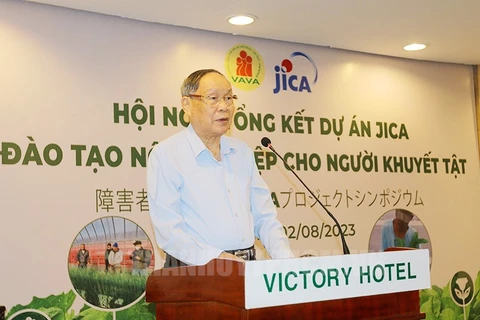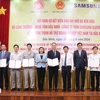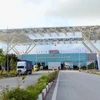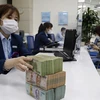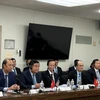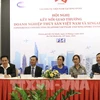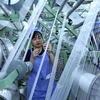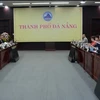Hanoi (VNA) - Japan International Cooperation Agency (JICA) is set to reinforce its commitment to cooperation with Vietnam across four critical areas, including high-quality infrastructure development, human resource development, healthcare advancements and climate change mitigation.
JICA's chief representative, Sugano Yuichi, underlined the significance of this year, marking the 50th anniversary of Japan-Vietnam diplomatic relations, emphasising that the relationship between the two countries has never been stronger.
"In the future, JICA will continue to contribute to Vietnam’s sustainable development, both in terms of physical infrastructure and the development of human resources, thereby further strengthening the burgeoning bond between Vietnam and Japan," Sugano said.
Over the past three decades, the Official Development Assistance (ODA) cooperation between Vietnam and Japan has flourished, solidifying their enduring partnership. This collaboration has yielded remarkable results in various sectors, including economic cooperation, investments and the cultivation of human resources. As the steward of Japan's ODA initiatives, JICA has played a pivotal role in nurturing this enduring alliance.
Throughout the 30-year journey of cooperation between Vietnam and Japan, there have been over 100 ongoing projects spanning diverse domains, such as education, healthcare, transportation, energy and agriculture. Vietnam stands among the top five countries benefiting from Japanese ODA.
"Since the resumption of ODA to Vietnam in 1992, Japan has contributed over three trillion JPY (equivalent to approximately 600 trillion VND) in cumulative ODA capital. Japan holds the distinction of being the most significant ODA donor among OECD member countries, underscoring its steadfast commitment to Vietnam's development," Sugano affirmed.
Japanese ODA has had a profound impact on infrastructure development in Vietnam, with projects like the National Highway 1, the North-South Expressway, and port constructions such as Lach Huyen and Cai Mep – Thi Vai ports fortifying Vietnam's economic foundation. The energy sector has also experienced substantial growth through Japanese ODA, with the construction of power plants bolstering the nation's energy infrastructure.
Japan's support has significantly benefited healthcare in Vietnam, with investments not only in core hospitals like Bach Mai Hospital but also in vaccine production. Collaborating with JICA has facilitated the production of 100% of measles and rubella vaccines, contributing significantly to expanded vaccination plans.
In the field of education, JICA's partnership with Can Tho University, spanning over half a century, is emblematic of their enduring relationship. Recent initiatives like the Vietnam Japan University (VJU) project, which began in 2016, continue to produce high-quality human resources for Vietnam while fostering international student exchanges.
As the 50th anniversary of Japan-Vietnam diplomatic relations approaches, the future of this dynamic partnership remains promising. Prime Minister Pham Minh Chinh has articulated his aspirations for sustainable development and a green economy, setting the stage for upcoming ODA cooperation plans.
Looking ahead, JICA will prioritise four key areas of cooperation. Firstly, there will be a focus on high-quality infrastructure projects, notably the HCM City urban railway and Noi Bai International Airport. Secondly, human resource development will continue to be a cornerstone of collaboration, with Can Tho University and VJU at the forefront.
Thirdly, the health sector will receive attention, with JICA supporting the implementation of remote medical systems and digital transformation techniques at local medical facilities. Additionally, collaboration with Japanese private enterprises, NGOs, and universities will enhance rehabilitation techniques and medical care to address the challenge of an aging population in Vietnam.
Lastly, JICA will actively engage in climate change initiatives, utilising the Green Climate Fund (GCF) to support afforestation activities and natural environment protection. This aligns with the Vietnamese Government's vision of achieving carbon neutrality by 2050, marking a significant step towards addressing climate change challenges.
"In the future, I hope that not only JICA but also related parties such as Japanese universities, local governments, private companies and non-governmental organisations will continue to participate in ODA projects to enhance people-to-people exchanges and further promote the growing relationship between the two countries," JICA’s chief representative said./.

